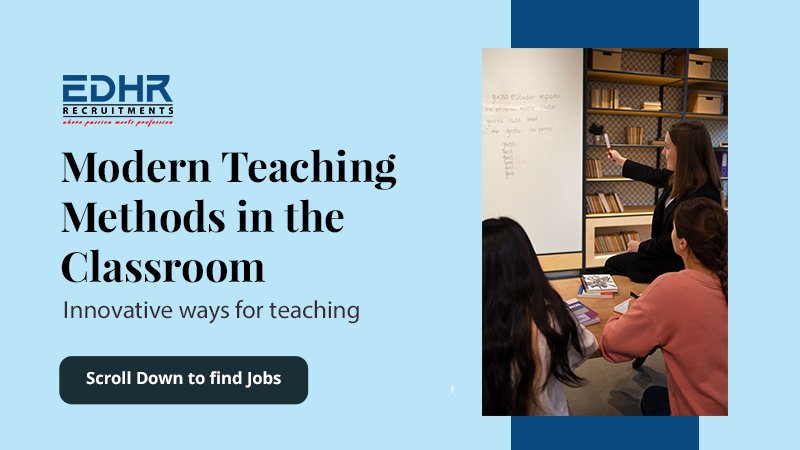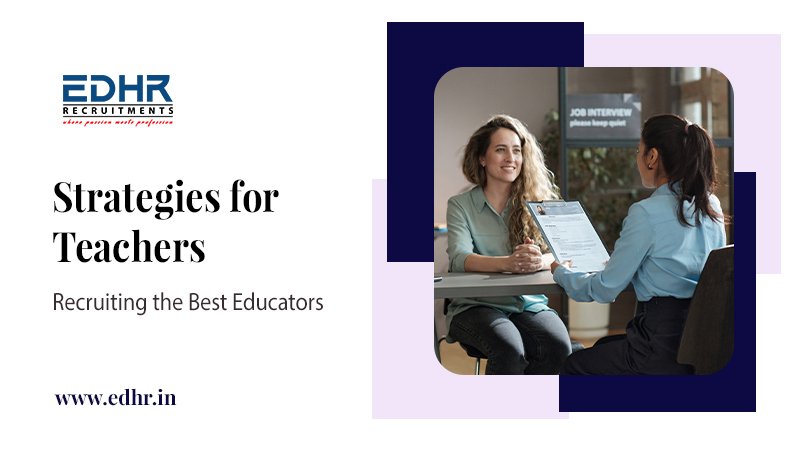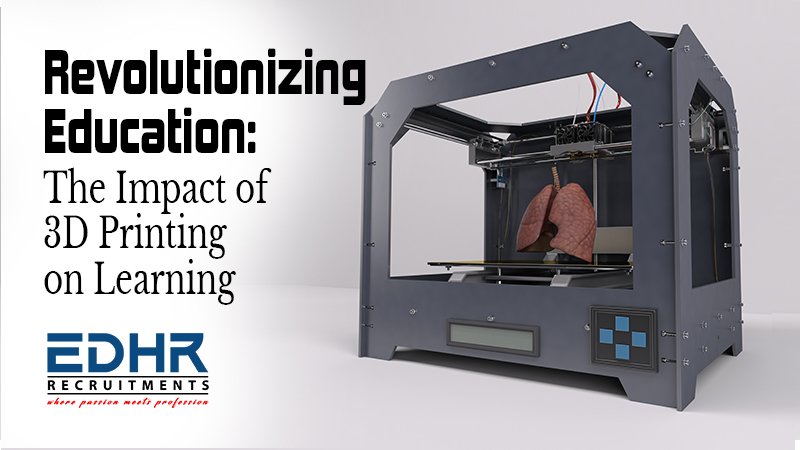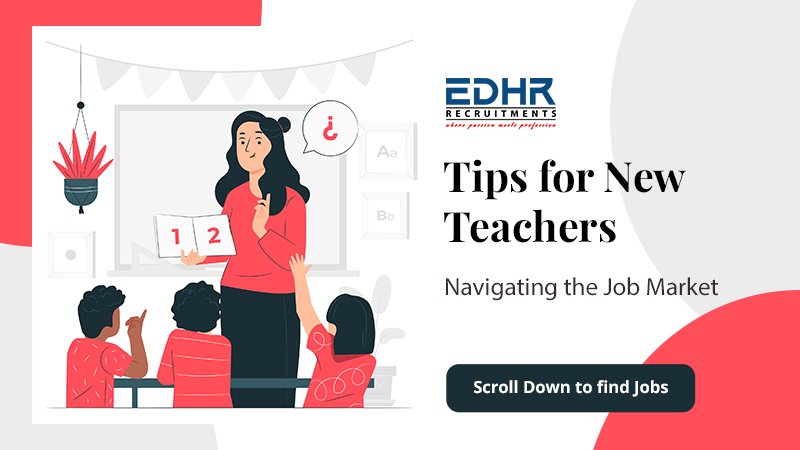Blog Details
Teacher Interview Question Answers - Tips with Sample Answers
-
By EDHR
-
23-Mar-2024
Preparing for a teacher interview can be nerve-wracking, but with the right strategies and preparation, you can confidently tackle even the toughest questions. In this blog post, we'll discuss common teacher interview questions and provide sample answers to help you showcase your skills, experience, and passion for teaching.
Tell Me About Yourself:
This open-ended question
allows you to provide a brief overview of your background, experience, and
teaching philosophy. Focus on highlighting relevant qualifications, such as
your education, teaching experience, and any specialised training or certifications.
For example: "I'm a dedicated and passionate educator with [X] years of
experience teaching [subject/grade level]. I hold a [degree/certification] in
[field] and have a strong commitment to fostering a supportive and inclusive
learning environment where every student can thrive."
Why Do You Want to Work at Our School?
Showcase your knowledge of the school's mission, values, and educational approach while highlighting what attracts you to the specific teaching position. Mention any research you've done about the school and its community. For example: "I'm drawn to [school name] because of its reputation for academic excellence and commitment to [specific value or approach, e.g., project-based learning]. I'm excited about the opportunity to contribute to a collaborative and innovative teaching environment where students are encouraged to explore, learn, and grow."
How Do You Differentiate Instruction to Meet the Needs of Diverse Learners?
Demonstrate your ability to
adapt instruction to meet the needs of students with varying abilities,
learning styles, and backgrounds. Provide specific examples of strategies
you've used, such as small group instruction, flexible grouping, and
differentiated assignments. For example: "I believe in providing multiple
pathways to learning to accommodate the diverse needs of my students. In my
classroom, I use a variety of instructional strategies, including hands-on
activities, visual aids, and technology tools, to engage students and make
content accessible to all learners."
How Do You Handle Classroom Management Challenges?
Address your approach to maintaining a positive and structured learning environment while managing behavior issues effectively. Emphasize proactive strategies for prevention and intervention, such as establishing clear expectations, building relationships with students, and implementing consistent consequences. For example: "I believe in setting clear expectations from day one and fostering a supportive classroom community where students feel respected and valued. When faced with classroom management challenges, I prioritize relationship-building and positive reinforcement while also implementing consistent and fair consequences to address behavior issues."
Can You Provide an Example of a Successful Lesson You've Taught?
Share a specific lesson or unit you've taught that was particularly successful, highlighting the objectives, instructional methods, and outcomes. Focus on how you engaged students, assessed learning, and met instructional goals. For example: "One of my most successful lessons was a [specific subject/topic] unit where students collaborated on a project to [describe project objective]. I incorporated hands-on activities, group discussions, and multimedia resources to engage students and deepen their understanding of the topic. As a result, students demonstrated mastery of the content through [specific assessment method, e.g., presentations, written reflections]."
How Do You Incorporate
Technology into Your Teaching?
Highlight your proficiency with educational technology
tools and your ability to integrate them seamlessly into instruction to enhance
student learning. Provide examples of specific tools or platforms you've used
and how they've positively impacted student engagement and achievement. For
example: "I believe in leveraging technology to enhance student learning
and prepare them for the digital world. In my classroom, I regularly use
interactive whiteboards, educational apps, and online collaboration tools to create
engaging and interactive lessons. For instance, I've used [specific technology
tool] to facilitate virtual field trips, [specific app] for formative
assessment, and [specific platform] for collaborative projects."
How Do You Collaborate with Colleagues and Support Staff ?
Demonstrate your ability to work effectively as part of a team and collaborate with colleagues, support staff, and administrators to support student success. Highlight examples of times you've collaborated on curriculum development, participated in professional learning communities, or supported colleagues in their teaching practice. For example: "I believe in the power of collaboration to improve student outcomes and create a positive school culture. In my previous role, I collaborated with colleagues on curriculum mapping, shared best practices in our professional learning community meetings, and participated in cross-disciplinary projects to integrate curriculum. I also worked closely with support staff, such as special education teachers and counsellors, to provide targeted support for students with diverse needs."
How Do You Stay Updated on Education Trends and Best Practices?
Demonstrate your commitment to professional growth and lifelong learning by discussing how you stay informed about current trends, research, and best practices in education. Mention specific professional development activities, such as attending conferences, workshops, and webinars, as well as reading educational journals and participating in online communities. For example: "As a lifelong learner, I'm committed to staying updated on the latest trends and best practices in education. I regularly attend conferences, such as [specific conference], where I have the opportunity to learn from experts in the field and network with other educators. I also participate in online webinars and communities, follow educational blogs, and read research articles to stay informed about emerging trends and innovative practices that can benefit my students."
How Do You Handle Parent Communication and Involvement?
Demonstrate your ability to build positive relationships with parents and involve them as partners in their child's education. Discuss your approach to regular communication, parent-teacher conferences, and involving parents in classroom activities and decision-making processes. For example: "I believe in fostering open and transparent communication with parents to support student success. I regularly communicate with parents through newsletters, emails, and phone calls to keep them informed about classroom activities and their child's progress. I also welcome parents into the classroom for events such as open houses, parent-teacher conferences, and volunteer opportunities, and I make myself available to address any questions or concerns they may have."
How Do You Differentiate Assessments to Meet the Needs of Individual Students?
Highlight your approach to assessing student learning in a way that is fair, equitable, and tailored to individual student needs and abilities. Discuss strategies for providing varied assessment opportunities, offering constructive feedback, and using assessment data to inform instruction and support student growth. For example: "I believe in using a variety of assessment methods to gauge student understanding and provide meaningful feedback. In addition to traditional tests and quizzes, I incorporate alternative assessments such as projects, presentations, and portfolios to accommodate different learning styles and preferences. I also use formative assessment techniques such as exit tickets and classroom observations to inform my instruction in real-time and provide targeted support for students who may be struggling."
Preparing for a teacher interview requires thoughtful reflection, preparation, and practice. By familiarizing yourself with common interview questions and crafting compelling answers that showcase your skills and experience, you can approach your next interview with confidence and poise. Remember to be authentic, enthusiastic, and passionate about the opportunity to make a positive impact as an educator.
Keen on shaping young minds and launching your teaching career? Sign up for the EDHR portal now.






















